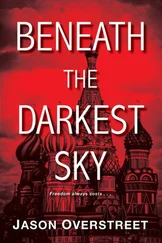She pinched his arm. “Look there!” she whispered. Only a few paces from them, atop a rock, sitting so still that they had not noticed him, was a venerable Arab, his legs tucked under him, his eyes shut. At first it seemed as though he might be asleep, in spite of his erect posture, since he made no sign of being conscious of their presence. But then they saw his lips moving ever so little, and they knew he was praying.
“Do you think we should watch like this?” she said, her voice hushed.
“It’s all right. We’ll just sit here quietly.” He put his head in her lap and lay looking up at the clear sky. Over and over, very lightly, she stroked his hair. The wind from the regions below gathered force. Slowly the sky lost its intensity of light. She glanced up at the Arab; he had not moved. Suddenly she wanted to go back, but she sat perfectly still for a while looking tenderly down at the inert head beneath her hand.
“You know,” said Port, and his voice sounded unreal, as voices are likely to do after a long pause in an utterly silent spot, “the sky here’s very strange. I often have the sensation when I look at it that it’s a solid thing up there, protecting us from what’s behind.”
Kit shuddered slightly as she said: “From what’s behind?”
“Yes.”
“But what is behind?” Her voice was very small.
“Nothing, I suppose. Just darkness. Absolute night—”
“Please don’t talk about it now.” There was agony in her entreaty. “Everything you say frightens me, up here. It’s getting dark, and the wind is blowing, and I can’t stand it.”
He sat up, put his arms about her neck, kissed her, drew back and looked at her, kissed her again, drew back again, and so on, several times. There were tears on her cheeks. She smiled forlornly as he rubbed them away with his forefingers.
“You know what?” he said with great earnestness. “I think we’re both afraid of the same thing. And for the same reason. We’ve never managed, either one of us, to get all the way into life. We’re hanging on to the outside for all we’re worth, convinced we’re going to fall off at the next bump. Isn’t that true?”
She shut her eyes for a moment. His lips on her cheek had awakened the sense of guilt, and it swept over her now in a great wave that made her dizzy and ill. She had spent her siesta trying to wipe her conscience clean of the things that had happened the night before, but now she was clearly aware that she had not been able to do it, and that she never would be able to do it. She put her hand to her forehead, holding it there. At length she said: “But if we’re not in, then we are more likely to fall off.”
She had hoped he would offer some argument to this, that he would find his own analogy faulty, perhaps that some consolation would be forthcoming. All he said was: “I don’t know.”
The light was growing palpably dimmer. Still the old Arab sat buried in his prayers, severe and statue-like in the advancing dusk. It seemed to Port that behind them, back on the plain, he could hear one long-drawn-out bugle note, but it went on and on. No man could hold his breath that long: it was his imagination. He took her hand and pressed it. “We must go back,” he whispered. Quickly they rose and went leaping over the rocks down to the road. The bicycles were there where they had left them. They coasted silently back toward the town. The dogs in the village set up a clamor as they sped past. At the market place they left the bicycles, and walked slowly through the street that led to the hotel, head on into the parade of men and sheep that continued its steady advance into the town, even at night.
All the way back to town Kit had been turning an idea over and over in her head: “Somehow Port knows about Tunner and me.” At the same time she did not believe he was conscious of knowing it. But with a deeper part of his intelligence she was certain he felt the truth, felt what had happened. As they walked along the dark street she was almost tempted to ask him how he knew. She was curious about the functioning of a purely animal sense like that, in a man as complex as Port. But it would have done no good; as soon as he had been made aware of his knowledge he would have decided to be furiously jealous, immediately there would have been a scene, and all the implicit tenderness between them would have vanished, perhaps never to be recovered. To have not even that tenuous communion with him would be unbearable.
Port did a curious thing when dinner was over. Alone he went out to the market, sat in the café for a few minutes watching the animals and men by the flickering carbide lamps, and on passing the open door of the shop where he had rented the bicycles, went in. There he asked for a bicycle equipped with a headlight, told the man to wait for him until he returned, and quickly rode off in the direction of the gap. Up there among the rocks it was cold, the night wind blew. There was no moon; he could not see the desert in front of him, down below—only the hard stars above that flared in the sky. He sat on the rock and let the wind chill him. Riding down to Boussif he realized he never could tell Kit that he had been back there. She would not understand his having wanted to return without her. Or perhaps, he reflected, she would understand it too well.
Two nights later they got on the bus for Aïn Krorfa, having chosen the night car to avoid the heat, which is oppressive along that route. Somehow, too, the dust seems less heavy when one cannot see it. Daytime, as the bus makes its way across this part of the desert, winding down and up through the small canyons, one watches the trail of dust that rises in the car’s wake, sometimes breathing it in when the road doubles back on itself sharply. The fine powder piles up on every surface which is anywhere near to being horizontal, and this includes the wrinkles in the skin, the eyelids, the insides of the ears, and even, on occasions, hidden spots like the navel. And by day, unless the traveler is accustomed to such quantities of dust, he is supremely conscious of its presence, and is likely to magnify the discomfort it causes him. But at night, because the stars are bright in the clear sky, he has the impression, so long as he does not move, that there is no dust. The steady hum of the motor lulls him into a trance-like state in which his entire attention goes to watching the road move endlessly toward him as the headlights uncover it. That is, until he falls asleep, to be awakened later by the stopping of the bus at some dark, forsaken bordj, where he gets out chilled and stiff, to drink a glass of sweet coffee inside the gates.
Having received their places in advance, they had been able to get the most desirable seats in the bus, which were those in front with the driver. There was less dust here, and the heat from the motor, although excessive and a bit uncomfortable for the feet, was welcome by eleven o’clock, when the warmth of the day had totally disappeared and they became conscious of the dry, intense cold that always comes at night in this high region. And so all three of them were squeezed together with the driver, on the front seat. Tunner, who sat by the door, seemed to be asleep. Kit, with her head resting heavily against Port’s arm, stirred a little now and then, but her eyes were closed. Straddling the emergency brake, and with his ribs continually being prodded by the driver’s elbow as he steered, Port had by far the least comfortable spot, and consequently he was wide awake. He sat staring ahead through the windshield at the flat road that kept coming on, always toward him, and always being devoured by the headlights. Whenever he was en route from one place to another, he was able to look at his life with a little more objectivity than usual. It was often on trips that he thought most clearly, and made the decisions that he could not reach when he was stationary.
Читать дальше











